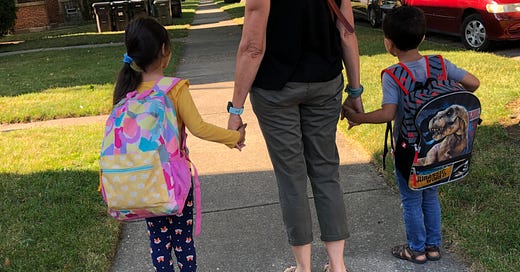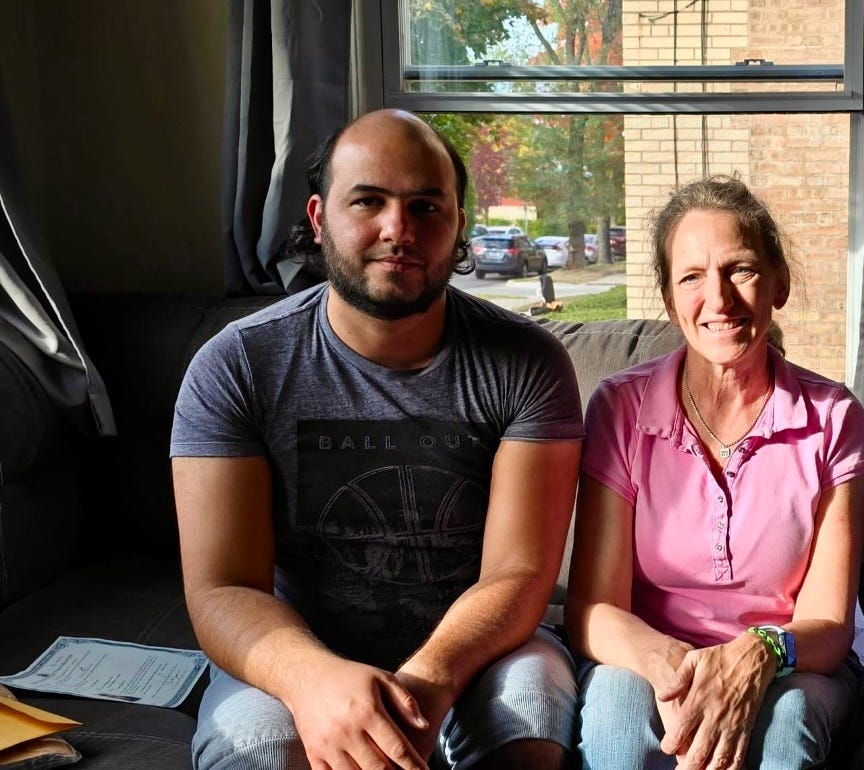What does it mean to love your neighbor?
Welcoming outside your home (or maybe outside your comfort zone)
What if I told you that one of the most significant ways you can practice welcoming does NOT involve cleaning your house, making food, or even having anyone over?
A little story to show you what I mean.
Seven and a half years ago, I befriended a refugee family from Syria. In the chaotic times leading to the 2016 election, I was shocked and saddened by the anti-immigrant hatred spewing from everywhere around me. Even, and especially, in spaces occupied by people of faith. I had to do something. To light a candle in the darkness, so to speak. I signed up to be a New Neighbor through Exodus World Service. (You can do the same, or learn more, here.)
I met my Syrian friends in early 2017. They were one of the last Muslim families to enter (completely legally) the U.S. before Trump’s “Muslim ban” not allowing vetted and legal immigrants from certain countries to come here.
I began visiting them, weekly at first, helping them learn English, answering their questions (mostly using Google Translate) about how to manage life in a new country. Because Middle Eastern culture values and practices hospitality, they welcomed me to their home, even though I was a stranger. Every time I visit they offer me tea, coffee, juice, food. They have little but they share it generously and gladly.
In the years since then, this family has become my family. The parents are the same age as my own grown children, so I have become their American mom, a grandma to their children (ages 5, 7 and 9).
So, that has meant doing the things a grandma or auntie might do. Which is why I spent yesterday helping to chaperone a field trip to the Chicago Botanic Garden with a group of second graders. (Sorry, I don’t have permission to share their photos but they were all adorable.)
This family’s middle son, born here not long after they arrived, was one of those second graders. When I walked into his classroom yesterday, he grinned from ear to ear.
Over the last eight years, I’ve been through a faith deconstruction and reconstruction, an evolution. Shocked by the violent and hateful rhetoric and actions of avowed Christians, I reevaluated evangelicalism (which had been hijacked and changed so much I didn’t recognize it) and redefined my faith. I came down to this: I just can’t give up on Jesus, even when the church appears to be selling its soul to a quest for power. I realized his teachings pointed to a path very different from the one Christian Nationalists are traveling.
Jesus said that the two most important commands are simple: love God and love your neighbor. When asked “who is my neighbor?” Jesus told a story of cross-cultural hospitality. (See Luke 10:25-37)
As I’ve embraced the practice of welcoming, I’ve found that it has been a source of meaning, purpose, and joy in my life. It’s been a lifeline in a chaotic time. Yes, I am giving, but also, receiving. Loving our neighbor is not an obligation but an opportunity.
Welcoming is the “how” of Jesus’ central command. Hospitality is how we love God and neighbor. It’s how we put our faith into action. We welcome others as if they were Jesus. (See Matthew 25: 31-46)
We wrongly think of hospitality as entertaining or decorating, impressing others with dinner parties. If we do so, we miss out on a wonderful opportunity. Biblical hospitality, as you know if you’ve been reading this newsletter for a while, is not about entertaining but about showing kindness in tangible ways to everyone, even strangers. Even immigrants.
Loving my Syrian refugee neighbors means visiting them and accepting their hospitality. Embracing the mutuality of the friendship. It means showing up for a couple of hours to read, help with homework, ease the loneliness, or whatever. It means being involved in the kids’ schooling and volunteering to go on field trips.
It means loving for the long haul. My relationship with this family is not a short-term mission. It’s not a “service project.” It’s an ongoing opportunity to experience the presence of Jesus.
P.S. Want to learn more about immigration issues? I highly recommend We Choose Welcome, a faith-based organization working for compassionate reform and response.
P.P.S. Welcoming a refugee family does not mean you’re obligated to a long-term friendship. Becoming a New Neighbor volunteer, for example, is only a three month commitment.
P.P.P.S. Curious about what welcoming refugees has been like? Visit my blog to read more about them.






I like how you’ve built a friendship with this family. How good of you to step into the role of “grandma” for field trips! Does the topic of faith ever come up with your friends? If so, how do you handle that?